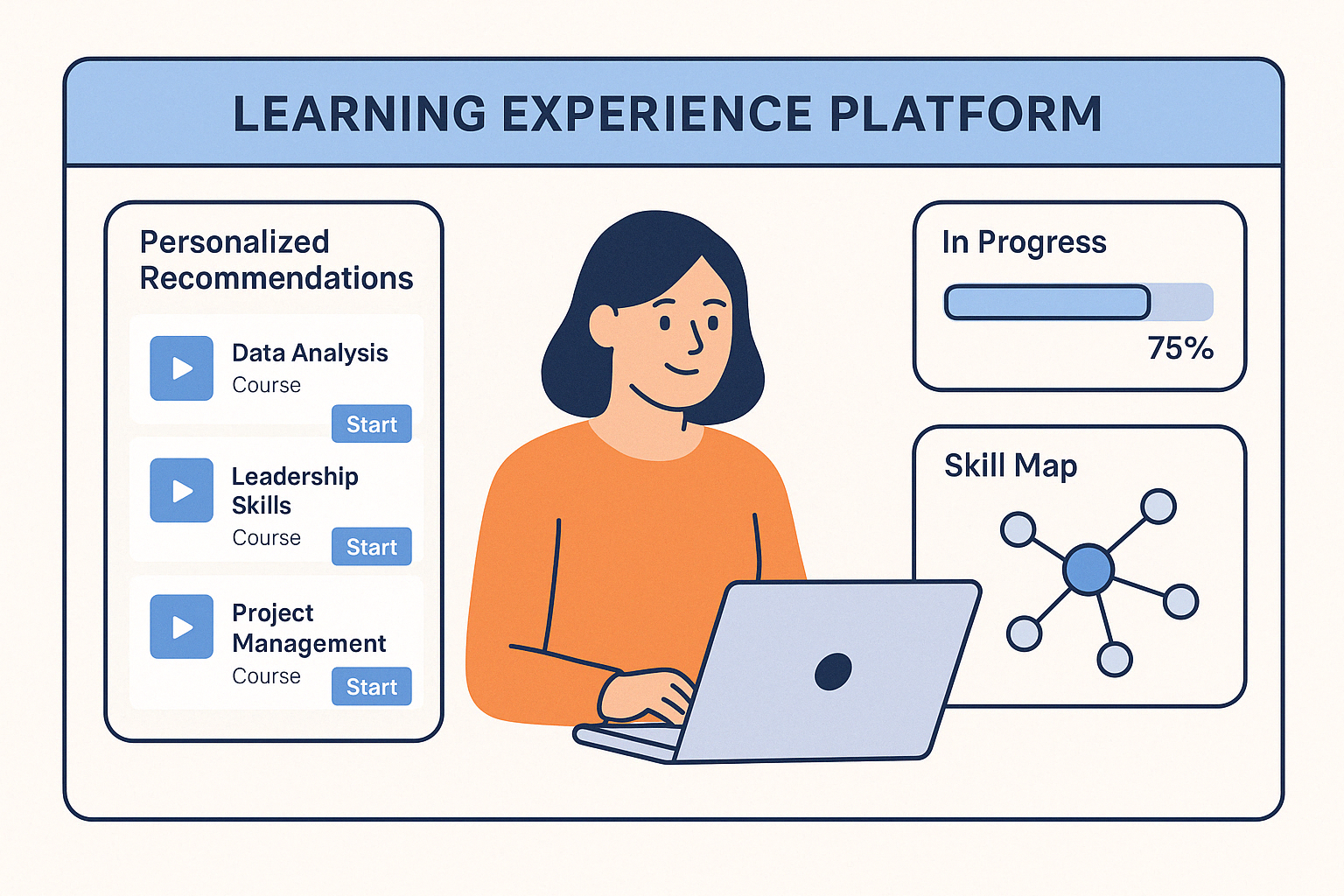Learning Experience Platform (LXP): Personalizing Learning in the Flow of Work
What Is a Learning Experience Platform (LXP)?
A Learning Experience Platform (LXP) is an AI-powered learning system that delivers personalized, engaging, and learner-centric experiences. Unlike traditional Learning Management Systems (LMS) that focus on mandatory training and course delivery, LXPs curate content from various sources and recommend learning paths based on user behavior, job roles, skill gaps, and career goals.
At its core, an LXP transforms learning from a top-down requirement into a self-directed, adaptive, and continuous journey—integrated with everyday workflows and performance data.
🔗 Related term: Skills Taxonomy
🔗 Related term: AI in Performance Management
🔗 Related term: Employee Experience Platform
LXP vs LMS: What's the Difference?
Feature | LMS (Learning Management System) | LXP (Learning Experience Platform) |
|---|---|---|
Focus | Compliance & formal training | Personalized learning experiences |
Content Delivery | Top-down, assigned by HR or managers | User-curated, AI-recommended |
Experience | Linear course progression | Netflix-style dynamic exploration |
Data Integration | Course completion tracking | Skill analytics, engagement trends, content feedback |
Content Sources | Internal only | Internal + external (LinkedIn Learning, Coursera, YouTube, etc.) |
Key Capabilities of an LXP
🎯 Personalized Content Recommendations
Learners receive curated suggestions based on role, interests, and recent performance.🧠 AI-Driven Skill Matching
Identifies skill gaps (from Skills Taxonomy) and suggests relevant microlearning paths.📊 Rich Learning Analytics
HR and managers gain insights into usage, engagement, completion rates, and skill readiness.🤝 Social Learning & Collaboration
Learners can like, share, comment, and recommend content to peers—enhancing collective knowledge.🔗 Seamless Integration
Connects with performance platforms, HRIS, and talent marketplaces for contextual learning nudges.📱 Multi-Format Delivery
Supports video, audio, blogs, podcasts, simulations, and interactive assessments.
Benefits of Using an LXP in Your Organization
✅ Accelerated Upskilling & Reskilling
Empowers employees to acquire the skills they need for today’s and tomorrow’s roles.
✅ Boosted Engagement & Retention
Employees feel valued and motivated when given ownership of their development.
✅ More Agile Workforce Planning
Skill insights from LXP usage help HR anticipate capability gaps and plan learning investments.
✅ Improved Learning ROI
Targeted, self-directed learning ensures that content is relevant, timely, and measurable.

Use Cases Across the Employee Lifecycle
Stage | LXP Application |
|---|---|
🔍 Preboarding | Deliver culture videos, welcome messages, and tools training before Day 1. |
🚀 Onboarding | Automate orientation and enable just-in-time learning in the first 90 days. |
🎓 Career Growth | Recommend certifications and leadership tracks based on aspiration + performance. |
🔁 Internal Mobility | Suggest learning for upcoming internal roles via Talent Marketplace integration. |
Real-World Examples of LXPs
Moka HR LXP can be integrated with performance reviews to push personalized learning paths post-assessment.
Degreed, EdCast, and 360Learning are popular LXP platforms used by enterprises for modular content, AI curation, and social learning.
Unilever’s “Flex Experiences” combines LXP with internal gigs, making learning part of real projects.
Challenges and How to Overcome Them
Challenge | Strategy |
|---|---|
Low adoption | Embed learning into workflows and performance check-ins. |
Content overload | Use AI filters and role-based tagging to surface only relevant content. |
Limited ROI tracking | Connect learning to performance data or mobility outcomes. |
Fragmented ecosystem | Choose LXPs that integrate with HRIS, LMS, and Employee Experience Platforms. |
FAQ: Learning Experience Platform (LXP)
Q1: Can an LXP replace our LMS?
Not necessarily. Many companies run LMS for compliance training and LXP for employee-driven learning. They complement each other.
Q2: Who benefits most from using an LXP?
All employees benefit, but LXPs are especially powerful for high-growth teams, future leaders, and employees preparing for lateral moves or promotions.
Q3: How is AI used in an LXP?
AI powers personalized recommendations, tracks behavior, maps skills, and suggests learning content in real-time.
Q4: Can LXPs integrate with performance or mobility systems?
Yes. Top LXPs integrate with AI performance systems, talent mobility tools, and even ATSs for continuous learning aligned with roles.
Conclusion
In the age of personalization, a Learning Experience Platform (LXP) is no longer a “nice to have”—it’s essential to building a resilient, skilled, and empowered workforce. By delivering adaptive, engaging, and actionable learning journeys, LXPs bring development into the flow of work and help talent grow from within.
HR Glossary: Master the Language of Modern HR
From recruiting candidates to onboarding new team members, MokaHR gives your company everything you need to be great at hiring.
Subscribe for more information

